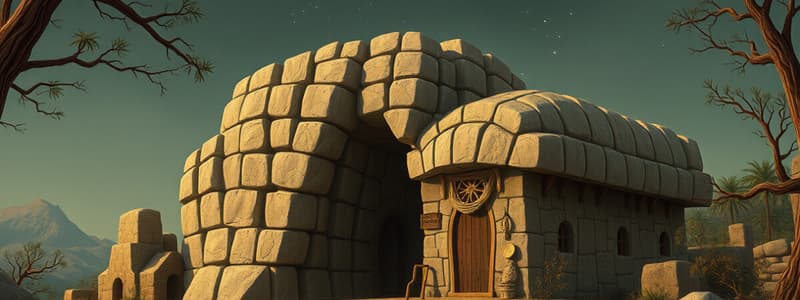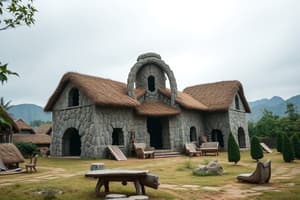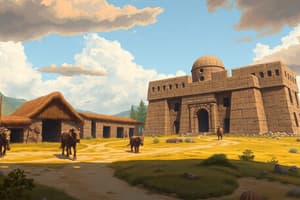Podcast
Questions and Answers
The prehistoric period was from 250KYA to 3KYA and is defined as a period of man's history that was not ______.
The prehistoric period was from 250KYA to 3KYA and is defined as a period of man's history that was not ______.
recorded
The Stone Age refers to the period from around 250KYA to ______.
The Stone Age refers to the period from around 250KYA to ______.
5KYA
The Bronze Age was from 5KYA to ______ years ago.
The Bronze Age was from 5KYA to ______ years ago.
3300
An important innovation during the Bronze Age was the ox-driven ______ and the wheel.
An important innovation during the Bronze Age was the ox-driven ______ and the wheel.
The Iron Age was from 3300 to ______ years ago.
The Iron Age was from 3300 to ______ years ago.
The Stone Age was divided into the paleolithic, mesolithic, and ______.
The Stone Age was divided into the paleolithic, mesolithic, and ______.
During the Paleolithic period, humans lived in caves, huts, and ______.
During the Paleolithic period, humans lived in caves, huts, and ______.
The end of the Paleolithic marked the end of the last ______ age.
The end of the Paleolithic marked the end of the last ______ age.
During the Mesolithic period, stone tools became more ______.
During the Mesolithic period, stone tools became more ______.
Towards the end of the Mesolithic period, prehistoric peoples began to establish permanent ______.
Towards the end of the Mesolithic period, prehistoric peoples began to establish permanent ______.
Flashcards
Prehistoric Period
Prehistoric Period
The period from 250,000 to 3,000 years ago, before recorded history.
Stone Age
Stone Age
The earliest and longest prehistoric age, characterized by stone tools.
Bronze
Bronze
An alloy of copper and tin, marking technological and societal advancements.
Iron Age
Iron Age
Signup and view all the flashcards
Paleolithic Period
Paleolithic Period
Signup and view all the flashcards
Mesolithic Period
Mesolithic Period
Signup and view all the flashcards
Neolithic Period
Neolithic Period
Signup and view all the flashcards
Agricultural Revolution
Agricultural Revolution
Signup and view all the flashcards
Animal Domestication
Animal Domestication
Signup and view all the flashcards
Eridu, Uruk, and Ur
Eridu, Uruk, and Ur
Signup and view all the flashcards
Study Notes
Prehistoric Period Overview
- Spans from 250,000 years ago (KYA) to 3,000 years ago (YA), characterized by the absence of recorded history.
- Divided into three main ages: Stone Age, Bronze Age, and Iron Age.
Stone Age
- Lasted from approximately 250 KYA to 5 KYA.
- Notable for the development of stone tools used for hunting, agriculture, and art.
- Marked a major transition from nomadic hunting and gathering to agricultural practices.
Bronze Age
- Occurred from 5 KYA to around 3,300 years ago.
- Emergence of bronze, an alloy of copper and tin.
- Innovations included the ox-driven plow and the wheel, enhancing agricultural productivity.
- Rise of organized governments, legal systems, warfare, and religious practices.
Iron Age
- Spanned from 3,300 to 2,900 years ago.
- Transition to iron production, which was more accessible than bronze.
- Introduction of iron tools and architectural advancements, including palaces and temples.
- Development of early city planning and the advent of writing systems, marking the beginning of recorded history.
Stone Age Subdivisions
Paleolithic Period
- Extended from 250 KYA to 12 KYA.
- Characterized by the use of basic stone and bone tools.
- Early humans lived in caves, huts, and teepees, practicing hunting and gathering.
- Discovery of fire allowed cooking of large prey like woolly mammoths, deer, and bison.
- Artistic expressions emerged, including cave paintings and small statues.
- End of the last ice age led to climate change, rising sea levels, and human migrations.
Mesolithic Period
- Lasted from 12 KYA to 10 KYA.
- Stone tools became more sophisticated, with improved polishing and assembly techniques.
- Continued nomadic lifestyle near water bodies, focused on hunting and gathering.
- Late in this period, many groups began establishing permanent settlements and farming.
Neolithic Period
- Spanned from 10 KYA to 5 KYA.
- Significant transition from nomadic lifestyles to permanent settlements and agriculture.
- Emergence of food production, animal domestication, and cultivation of cereal grains.
- Advancements in farming tools and architecture, such as polished hand axes and bladed plows.
- Increased food availability led to population growth and evolution from villages to towns and cities.
- Prominent early cities included Eridu, Uruk, and Ur, located in the Tigris and Euphrates river region (modern-day Iraq).
Studying That Suits You
Use AI to generate personalized quizzes and flashcards to suit your learning preferences.




